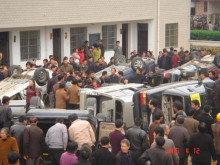 The recent deadly riots in Cairo. Egypt during August have been shocking. Equally alarming have been other conflicts, such as Syria, with the alleged use of nerve gas on civilians. It is debatable whether the greater tragedy is the killing itself or the paralysis of the international community to stop the carnage. The world seems to react by either remaining silent, uttering verbal admonitions, or broadcasting hollow threats of an action that never occurs. Meanwhile, the death count rises.
The recent deadly riots in Cairo. Egypt during August have been shocking. Equally alarming have been other conflicts, such as Syria, with the alleged use of nerve gas on civilians. It is debatable whether the greater tragedy is the killing itself or the paralysis of the international community to stop the carnage. The world seems to react by either remaining silent, uttering verbal admonitions, or broadcasting hollow threats of an action that never occurs. Meanwhile, the death count rises.
The factors that contribute to civil strife are legion. Politics, religion, ethnicity, social class, economics, and lust for absolute power can contribute to the recipe for this poisoning dish. Regardless of cause, the humanitarian toll is colossal. The international community has spent literally trillions of both dollars and relief aid hours trying to remedy the impacts, with very limited success.
My journey of serving in 15 countries in 20 years is a case in point. A few of my responses may be labeled crises from pure natural disasters, such as an earthquake in Bam, Iran in 2003, the SE Asia tsunami in 2005, or Hurricane Katrina. However, most of my disaster responses have at least partially been human-induced. Some caused by outright fighting, and others by government policies  that have contributed to citizens having to live with a higher level of risk from a hazard. These are called “complex emergencies”.
that have contributed to citizens having to live with a higher level of risk from a hazard. These are called “complex emergencies”.
My first post in Africa was Ethiopia, in 1984, during the terrible drought that shocked the world – and me. I landed into the middle of a huge country and a tragedy, working with World Vision in three refugee camps. It was like the TV newsreel, only worst. Starving children were ubiquitous. During my time in Ethiopia, I came to realize that nature’s lack of water wasn’t the only culprit causing the loss of crops, and subsequent starvation. The Ethiopian government had implemented price and production policies that, apart from encouraging growing crops, actually discouraged villagers from farming. Villagers raised only subsistence crops (i.e. household use). When the drought did come, villagers had no food security, no ‘cushion’ of crop storage upon which to fall. The result was a famine.
 I have many illustrations from my brief global sojourn. Civil strife in Liberia, Rwanda, Burundi, Congo, Somalia, and Kosovo, where food security is rare due to the very nature of conflict. Guerrilla fighters, freedom fighters, liberation fronts…whatever the name of choice…enter a village, abuse the people, and steal the crops. By definition, vegetable and grains are exposed and vulnerable. Villagers pick up what few pieces remain.
I have many illustrations from my brief global sojourn. Civil strife in Liberia, Rwanda, Burundi, Congo, Somalia, and Kosovo, where food security is rare due to the very nature of conflict. Guerrilla fighters, freedom fighters, liberation fronts…whatever the name of choice…enter a village, abuse the people, and steal the crops. By definition, vegetable and grains are exposed and vulnerable. Villagers pick up what few pieces remain.
In other posting, such as Malawi, Kenya, Haiti, and a couple more in Ethiopia, I witnessed land tenure as a rare commodity, meaning that a farmer does not own his land. What incentive does s/he have to make the farm productive – build the soil, prevent erosion, provide irrigation, plant trees – to improve the land? An ethnic leader or government official may come along, admire the improved and productive farm plot, and confiscate it. Even if there is legal recourse, it may be in front of the very one who has taken the farm!
Most of my postings have been to countries that, for one reason or another, are self- destructing. This is happening before our eyes in  Egypt and Syria. It has happened in many other countries. We in the West are obligated to do something. But what can we actually do? I offer that the seeds for many humanitarian crises that supposedly erupt suddenly have been fomenting for many years. A watchful and trained eye (I am not one of these!) would likely see some signals of pending unrest, instability, and upheaval. Surely, a supportive dialogue and humanitarian reforms at this early stage would cost much less. Otherwise, the window of opportunity is lost. The international community’s only recourse is to pass a condemning resolution, appeal for nations to cough up money, and deploy humanitarian aid workers such as myself, who, at great cost, are unable to do little more than put a bandage on a cancerous wound. It is a shame. It was in 1983, and remains so in 2013.
Egypt and Syria. It has happened in many other countries. We in the West are obligated to do something. But what can we actually do? I offer that the seeds for many humanitarian crises that supposedly erupt suddenly have been fomenting for many years. A watchful and trained eye (I am not one of these!) would likely see some signals of pending unrest, instability, and upheaval. Surely, a supportive dialogue and humanitarian reforms at this early stage would cost much less. Otherwise, the window of opportunity is lost. The international community’s only recourse is to pass a condemning resolution, appeal for nations to cough up money, and deploy humanitarian aid workers such as myself, who, at great cost, are unable to do little more than put a bandage on a cancerous wound. It is a shame. It was in 1983, and remains so in 2013.
I will try to be a bit more positive on a future blog! Thanks for reading.
Monty
Leave a Reply
You must be logged in to post a comment.